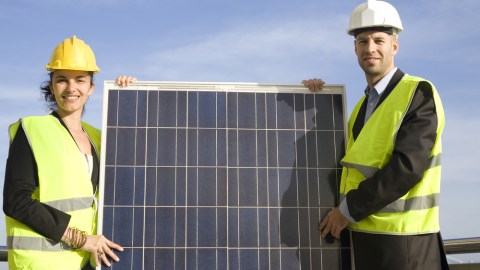Is Solar Energy the Next Great Crowdfunding Experiment?

If there’s one trend in 2013 that’s capable of changing the way we think about clean energy, it’s the professionalization of the crowdfunding movement. California-based Mosaic, which officially launched to the investing public this week, has a bold vision for bringing clean energy to the nation: tap into the power of the crowd to raise as much as $1 trillion for solar power projects across the country.
In the first 8 hours after launch, Mosaic nearly sold out its entire inventory of solar power crowdfunding projects, raising $225,000. Within 24 hours, the crowd had stepped up even more, raising the full $300,000 required to fund the company’s solar energy projects. To put that into context – that’s the equivalent of posting three projects on Kickstarter and raking in $300,000 from people you have never met within hours. While the minimum investment amount on the Mosaic investment platform is $25 – the same minimum as on a popular crowdfunding platform like Kiva – the average investor actually plunked down $670. (attracted, in part, by the 4.5% return on their investment).
While it’s easy to be skeptical that this momentum can be maintained over the long-term, Mosaic’s experiment gives you a glimpse of what’s possible when the crowd gets involved.
Making the Mosaic crowdfunding experiment all the more exciting is the potenial for solar power – more so than any other clean energy power source – to become a truly exponential technology. Nearly two years ago, in fact, Ray Kurzweil on Big Think theorized about the potential for solar power to become a cheap, renewable energy source within two decades. As Kurzweil pointed out in his interview:
“Solar panels are coming down dramatically in cost per watt. And as a result of that, the total amount of solar energy is growing, not linearly, but exponentially. It’s doubling every 2 years and has been for 20 years. And again, it’s a very smooth curve. There’s all these arguments, subsidies and political battles and companies going bankrupt, they’re raising billions of dollars, but behind all that chaos is this very smooth progression.”
Solar energy, it turns out, is an exponential technology just like computing. The same way that Moore’s Law means that computers are doubling in computing power every 18 months, it means that the amount of solar energy being produced by solar panels is doubling every 2 years. The logic is simple – in order to use the power of the sun, you need incredibly efficient solar panels capable of capturing some share of the sunlight falling to the earth. To do that cheaply, you need the cost of solar panels to be as low as possible – something made possible by recent technological advances. Combine that with the ultimate clean power source – the sun – and it’s easy to see why solar energy has the potential to become the fastest-growing alternative energy source ever, doubling every two years.
The big question for now is whether Mosaic can continue to find the types of low-risk, high-quality solar energy projects capable of attracting investors amidst a challenging regulatory environment. Let’s face it, how many investment opportunities are there out there these days that promise to pay 4.5% in annual returns (the amount promised by Mosaic’s first three solar projects)? And, making matters even thornier, from now on, every solar project from Mosaic needs to get regulatory sign-off. That’s a lot of paperwork.
Despite all the looming regulatory and (potentially) political battles as Mosaic’s crowdfunding experiment expands beyond New York and California, the future potential of what the company is attempting to do is nothing short of remarkable. A few years ago, the concept of reaching out to average Joes and Janes through an online crowdfunding platform to fund clean energy projects would have been laughable. But, thanks to the proven track record of crowdfunding platforms like Kickstarter in funding projects of increasing size and complexity, a clean energy future could one day be a reality. The crowd, it turns out, is not just wise – but also comes with a sunny disposition, ready and able to do good when asked.
image: Businesspeople with big solar panel / Shutterstock




